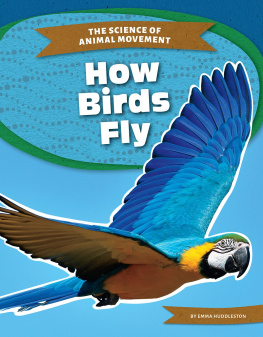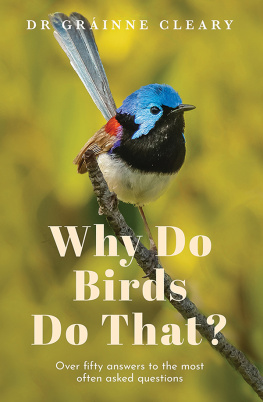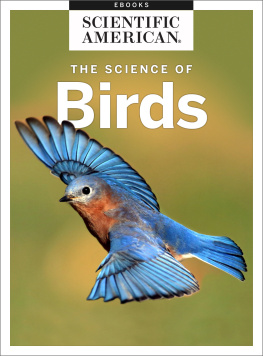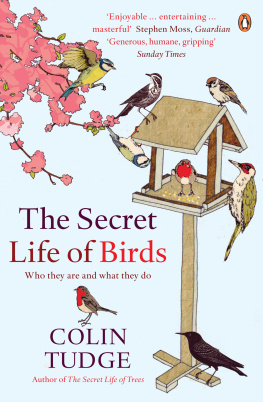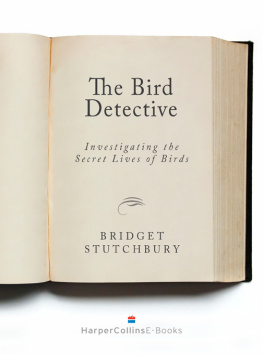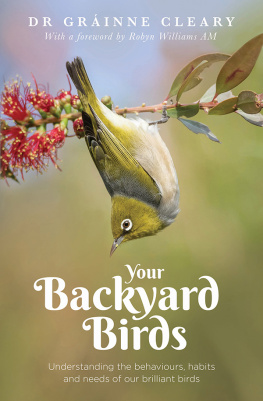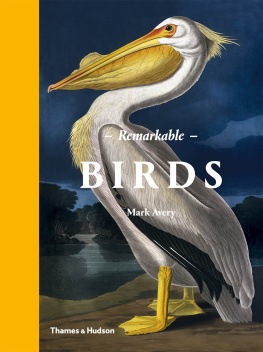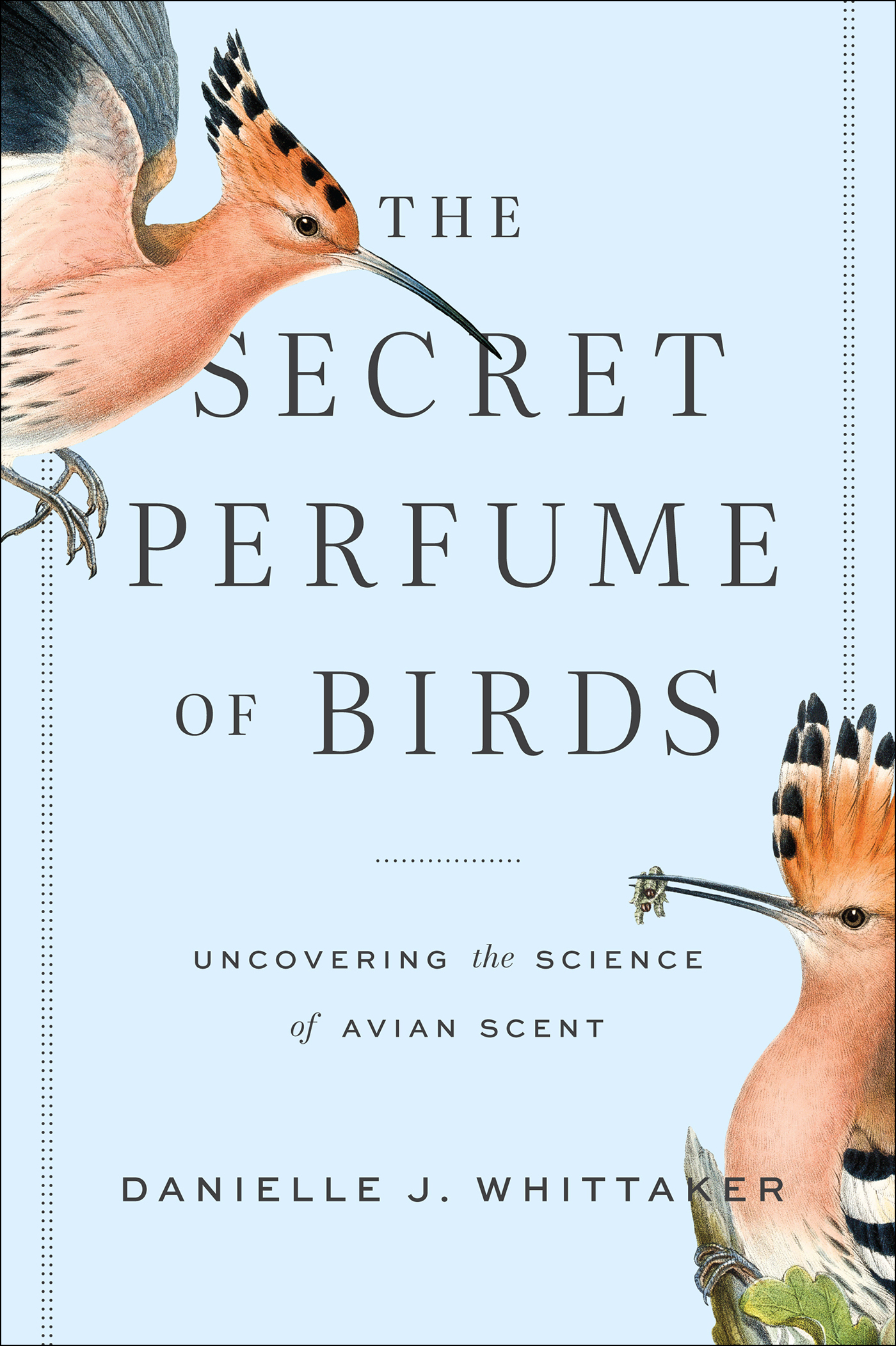THE SECRET PERFUME OF BIRDS
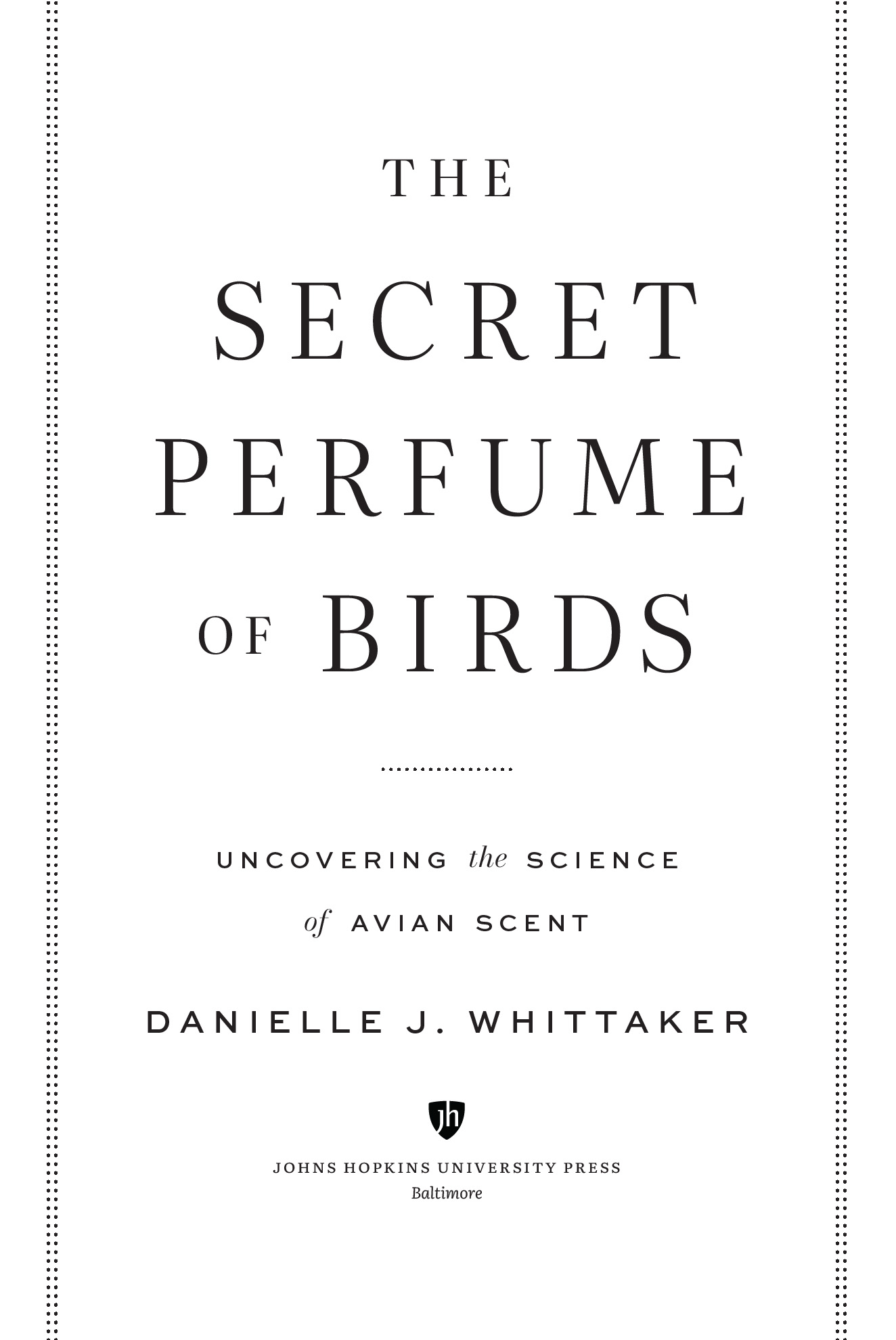
2022 JOHNS HOPKINS UNIVERSITY PRESS
All rights reserved. Published 2022
Printed in the United States of America on acid-free paper
2 4 6 8 9 7 5 3 1
Johns Hopkins University Press
2715 North Charles Street
Baltimore, Maryland 212184363
www.press.jhu.edu
Names: Whittaker, Danielle J. (Danielle June), author.
Title: The secret perfume of birds : uncovering the science of avian scent / Danielle J. Whittaker.
Description: Baltimore : Johns Hopkins University Press, 2022. | Includes bibliographical references and index.
Identifiers: LCCN 2021020601 | ISBN 9781421443478 (hardcover) | ISBN 9781421443485 (ebook)
Subjects: LCSH: BirdsOdors. | BirdsBehavior.
Classification: LCC QL698.3 .W45 2022 | DDC 598.15dc23
LC record available at https://lccn.loc.gov/2021020601
Cover and interior design by Amanda Weiss
A catalog record for this book is available from the British Library.
Special discounts are available for bulk purchases of this book. For more information, please contact Special Sales at specialsales@jh.edu.
To Ellen Ketterson
my mentor, role model, and friend
PREFACE
FOLLOW YOUR NOSE
Follow your nose! It always knows!
TOUCAN SAM , mascot for Kelloggs Froot Loops cereal
Follow your nose: To trust your own feelings rather than obeying rules or allowing yourself to be influenced by other peoples opinions.
Cambridge Dictionary
The bird was mocking me.
It was a beautiful Memorial Day weekend at an old-fashioned, lakeside mountain resort in Virginia. (In fact, it was the one made famous as Kellermans in the movie Dirty Dancing.) I was perched precariously on the side of a hill that sloped down to the lake, where I had been trying for hours to catch this particularly elusive dark-eyed junco. Her mate, clearly less crafty than she was, had flown into my large but nearly invisible net shortly after I set it up a few feet away from their nest. I had measured him, taken samples, and safely released him over two hours ago. But this female, who went by the catchy name of 2221-57423, seemed to have sniffed out the situation and had flown neatly around the net, easily evading capture every time she left or returned to her nest. I sighed and stared at a discarded Clamato can nestled among the pines.
I have never been particularly good at long-term planning. Mapping out an explicit five- or ten-year plan seems foolish to me because life never goes the way you think it will. Ive found it better to have a general idea of what youd like to achieve, and to then adapt to whatever unexpected events unfold along the way to your goal. Even if, like the male junco, you get trapped in a net and sampled for someones study, your eventual release may encourage you to carry on in a different direction.
People who want to succeed in academia are typically advised to follow a well-traveled path, with a plan in place from the beginning. First, you should already know by the time youre in college that youd like to be a scientist, and you should know what kind of science interests you. You should find an opportunity to conduct research in a lab while you are still an undergraduate, then know exactly what youd like to pursue in graduate school and apply to work with a specific mentor. Once in graduate school, you need to carry out interesting, important, strategic research and publish your work before you graduate, which you must accomplish in six years or fewer. Then, you should have a postdoctoral fellowship already lined up, with clear plans for one or two years of research with another mentor. Finally, before this fellowship runs out, you should land a tenure-track position as an assistant professor and then spend the majority of your time writing winning grant proposals and training fabulous new graduate students and postdocs.
I did not do any of these things.
As an undergraduate at Emory University in Atlanta, I was a starry-eyed English major who understood nothing about how academia worked. I was valedictorian of my high school, with a perfect GPA, high standardized test scores, and a full scholarship to college. I wanted to be a professor of medieval English literature, and I assumed success in academia would follow the same formula as in high school: work hard, get good grades, then get the job you want. Also, I supposed that you would need to have some intriguing, original ideasand I hoped that I would eventually develop some of those. But I was too shy and felt too far out of my element to ask for help. So, instead of actually meeting with professors and learning how academia worked, I simply followed the universitys written guidelines about how to complete all the requirements for your major and for graduation. It seemed straightforward enough. But at some point, I realized that I should know quite a bit more about life in medieval Europe than I could glean just from studying the literature, and I decided to expand my education with medieval art history and Latin classes. I spent my junior year abroad at Trinity College in Dublin, Irelandmy first time ever leaving the United Statesand there I intensively studied English literature. It was a dream made real. Only I discovered that it was not, in fact, my dream. Once I was exposed to the centuries of interpretation and research that scholars had already published, I started to feel that there was probably nothing fresh and compelling to be said about Chaucer or Sir Gawain and the Green Knight. And even if new insights were still to be had, I didnt think I was creative enough to have them.
When I returned home for my senior year, I felt confused and disenchanted with the route I had followed so far. I decided I needed to change everything, and I abruptly switched to a new major. Before my year abroad, I had fulfilled most of my science requirements with anthropology classes, and I had found them all interesting. Anthropology, as it is taught in the United States, is incredibly broad, encompassing cultural anthropology, biological anthropology, archaeology, and linguistics. In my senior year, I took fascinating courses to fill out the requirements for an anthropology major, including classes on nutritional anthropology, human sexuality, andmost important for the path I ultimately tookprimate behavior and ecology. I loved learning about our closest living relatives, how they interact with each other, and how similar we are to them. I particularly loved gibbons, small monogamous apes of Southeast Asia with long arms who sing beautiful, mournful dawn songs.
When I graduated from Emory in 1996, I was no closer to figuring out what I wanted to do with my life than I had been at the beginning of college. I decided that academia probably wasnt for me. Every summer during college, I had worked as an office temp, impressing my employers with my organizational skills and typing speed. When a financial printing firm in Atlanta offered me a full-time position as a typesetter, I took it. The job paid well, especially for someone just out of college. Unfortunately, it was boring as hell, and soon I wanted to be anywhere else. I immersed myself in nonfiction books about primate fieldwork and fantasized about going to African or Asian jungles.
I honestly have no idea why I suddenly decided I should spend years in tropical rain forests, sweating and hiking and getting bitten by mosquitoes. I was never outdoorsy as a child. I went camping a couple of times with friends, and sure, I wandered through the woods a bit on my own. But looking back at those times, I see no evidence of a budding young naturalist. I was, instead, indoorsy: I liked to read books and listen to music and watch television. I was not activein the eighth grade, I failed gym class because I refused to participate. But I was dissatisfied at the prospect of living the mundane life that all my peers were embracing. I had no interest in desk jobs, real estate, or raising children. I wanted to travel and experience things that ordinary people never didand these stories about fieldwork showed me a different way to live.


